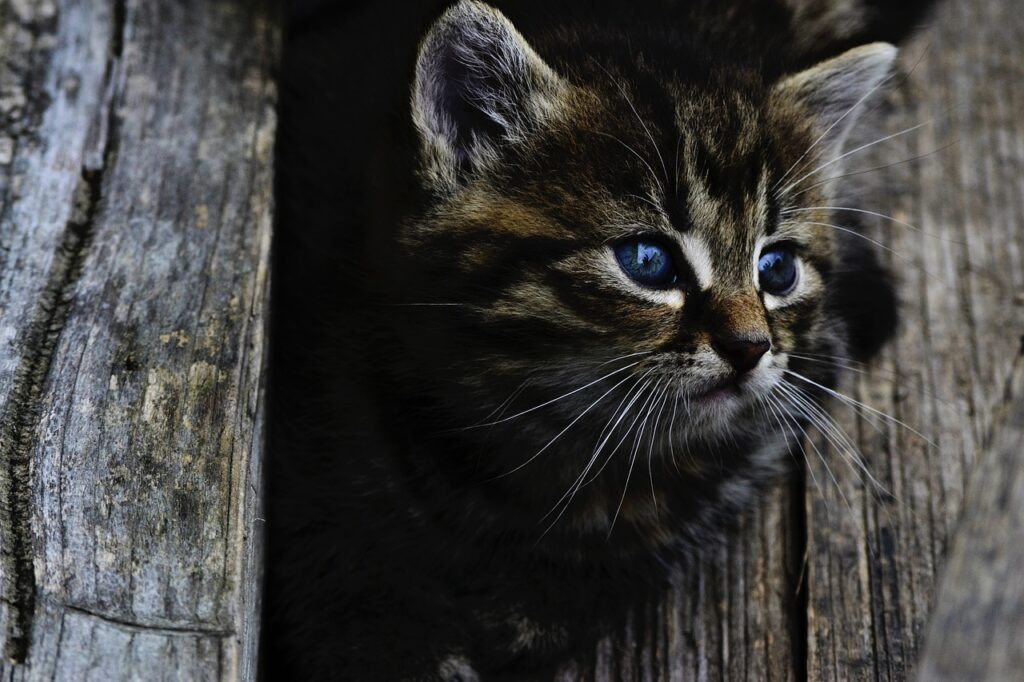Can Cats Eat Chickpeas? – Yes, They can in moderation
While chickpeas aren’t toxic to cats, they should be given as an occasional treat rather than a staple in their diet. Cats are obligatory carnivores, which means their bodies are designed to digest and use nutrients from animal products more efficiently than those from plants. Chickpeas can offer some nutritional benefits, but they need to be prepared correctly and given in moderation. It’s important to remove any seasoning or additives that could be harmful to your feline friend.
Can Kittens Eat Chickpeas?
It’s best to be cautious with kittens and chickpeas. A kitten’s digestive system is more sensitive than an adult cat’s, and their dietary requirements are specific to support rapid growth and development. Therefore, introducing chickpeas to a kitten should be done with extreme caution, if at all. If you decide to give your kitten chickpeas, it should be a minimal amount and infrequently to avoid any potential digestive upset.
Things to consider when feeding chickpeas to kittens?
When considering feeding chickpeas to kittens, think about their sensitive stomachs and the importance of a balanced diet that provides all the necessary nutrients. Chickpeas lack the amino acids and taurine that a growing kitten fundamentally needs from a meat-based diet. If a kitten consumes too many chickpeas, this could potentially lead to digestive issues and nutritional imbalances. Always consult with a vet before introducing new foods to your kitten’s diet.
Nutritional Benefits of Chickpeas for Cats – Why Chickpeas are good for Cats?
Fiber
Chickpeas are a good source of fiber, which can help support digestive health in cats when fed appropriately. However, too much fiber can cause issues, so it’s crucial to only feed chickpeas in small quantities.
Protein
Although cats require animal-based protein, chickpeas do provide plant-based protein and can be offered as a supplement to a cat’s diet, especially for those seeking alternative protein sources.
Minerals
Chickpeas contain minerals such as manganese, which plays a role in many enzyme functions, and folate, which can support cellular growth and function.
Vitamins
They also offer vitamins like B vitamins and vitamin K. These are important for maintaining healthy skin, nerves, and muscle function.
Low Fat
Chickpeas have a relatively low-fat content, which can be advantageous for maintaining a healthy weight in cats.
Potential Allergies: Can Cats Be Allergic to Chickpeas?
Yes, as with any food item, cats can potentially be allergic to chickpeas. It’s important to monitor your cat when introducing any new food item to their diet for signs of an allergy.
Symptoms of Chickpea Allergies in Cats
- Itchiness: Look for your cat scratching more than usual or excessive grooming.
- Gastrointestinal Distress: This can present as vomiting or diarrhea after consuming chickpeas.
- Respiratory Issues: In rare cases, an allergic reaction could cause coughing or wheezing.
What to Do If Your Cat Shows Symptoms?
- Elimination Diet: If you suspect an allergy, remove chickpeas from your cat’s diet immediately and consult with a veterinarian.
- Veterinary Care: A professional can conduct tests to confirm an allergy and advise on treatment and dietary adjustments.
- Symptom Management: Follow your vet’s instructions for managing any allergic reactions, which might include medications or home care tips.
Recommended Amount: How Much Chickpeas Can a Cat Consume?
Cats should only consume a small amount of chickpeas. If you decide to offer your cat chickpeas, start with a teaspoon-sized portion to ensure they can digest them without any adverse effects. Never replace a significant portion of their diet with chickpeas.
Things to Consider When Feeding Chickpeas to Cats
Always cook chickpeas thoroughly and serve them plain, without any added salt, spices, or other ingredients that could be toxic to cats. Because chickpeas are not a natural part of a cat’s diet, they should never be a daily food item.
How to Feed Chickpeas to Cats: A Quick Guide
Integrating chickpeas into your cat’s diet can be done safely if you treat it as a rare delicacy. Below are simple ways to include chickpeas in your cat’s meals.
Plain Pureed Chickpeas
Simply puree cooked chickpeas with a bit of water until smooth. Offer a small teaspoonful as a treat.
Baked Chickpea Crunchies
Mash plain cooked chickpeas into a paste, create small pea-sized balls, and bake them at a low temperature until dry and crunchy.
Chickpea-Topped Dinner
Add a few whole, cooked chickpeas on top of your cat’s regular meal as an occasional garnish.
Conclusion
In summary, cats can eat chickpeas in moderation and with caution. It’s crucial to cook them thoroughly and offer them plain, with no added seasonings. Always start with a small amount to see how your cat reacts, and consult with your vet if you are unsure about including chickpeas in your cat’s diet. Remember, the foundation of your cat’s diet should be a high-quality, meat-based cat food that provides all the essential nutrients they need for a healthy life.



